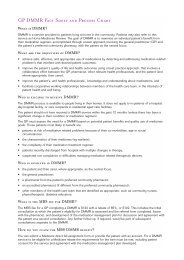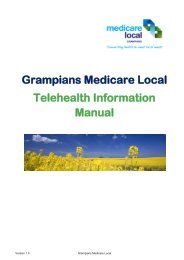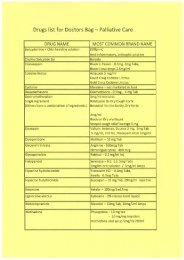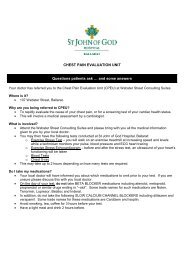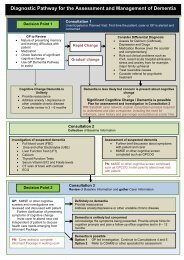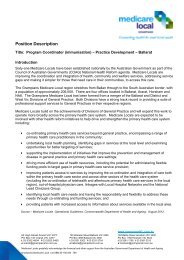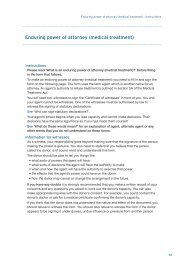Doctor's Bag: Palliative Care Information booklet - Grampians ...
Doctor's Bag: Palliative Care Information booklet - Grampians ...
Doctor's Bag: Palliative Care Information booklet - Grampians ...
You also want an ePaper? Increase the reach of your titles
YUMPU automatically turns print PDFs into web optimized ePapers that Google loves.
Individualised Treatment<br />
Individualising treatment depends on:<br />
Symptom<br />
Control<br />
• The available options (eg radiotherapy,<br />
chemotherapy)<br />
• Weighing benefits against burdens for each<br />
patient<br />
• The wishes of the patient and family<br />
• Optimal symptom control requires a<br />
multidisciplinary approach.<br />
Attention to Detail<br />
Evaluation<br />
Evaluate the symptom<br />
What are the likely causes (remembering a symptom<br />
may be due to disease progression, to treatment and<br />
medications or to intercurrent illness)? Accept the<br />
patient’s description of the symptom. What options<br />
are there to modify and are there any other factors<br />
impacting on the severity of the symptom?<br />
Evaluate the patient<br />
How far has the disease progressed? Is there a<br />
temporary relapse, which may be reversible or the<br />
terminal stage? What is the patient’s understanding<br />
of and response to the symptom?<br />
Explanation<br />
Informing the patient about the likely cause of the<br />
symptom can reduce their level of anxiety. A new<br />
symptom does not necessarily mean the disease is<br />
worse, but if it does, it may provide an opportunity<br />
to discuss the implications and prognosis, and<br />
prompt review of the patient’s life goals and<br />
priorities.<br />
Even small improvements in symptom control may<br />
be worthwhile. Thoroughness and fine tuning are<br />
important.<br />
Monitoring of Progress<br />
An important facet of care is a proactive approach<br />
to symptom control. Review the patient, their<br />
symptoms and their therapy frequently, as the<br />
situation of a patient with a terminal illness may<br />
change quickly. New symptoms can emerge and<br />
old symptoms recede.<br />
Rapid Dose Escalation<br />
There is a need to recognise extreme situations<br />
of distress in a dying patient. In these situations,<br />
an urgent response is required, with rapid dose<br />
titration and dose escalation over a short period of<br />
time if necessary.<br />
Discussion<br />
Discuss the treatment options and the likely<br />
outcomes with the patient. The following questions<br />
should be addressed:<br />
• What is the best outcome with the proposed<br />
treatment?<br />
• What is the possibility of no change or<br />
deterioration with the proposed treatment?<br />
• What will be required? (eg tests, hospitalisation,<br />
more tablets)<br />
• What if nothing is done about this symptom?





